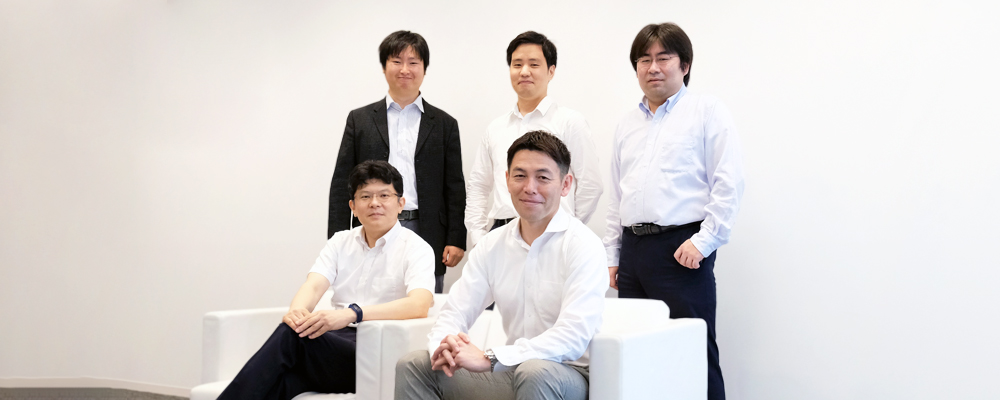
Secure Multiparty Computation: The Key to the Future of Digital Capitalism
“Secure multiparty computation”, which makes it possible to analyze and process encrypted information, holds great promise both as a means of promoting effective data utilization while protecting personal data privacy, and as a way to solve social problems and revitalize industries through the sharing of data among different parties. At NRI Group, our experts in various fields have been working toward the practical implementation of this technology. NRI Digital member Takumi Yasumasu, who leads this team, believes this technology “holds the key to achieving digital capitalism”. We sat down with five team members from different posts and backgrounds—Yasumasu himself, Hiroshi Nakajima and Kotaro Tamura of NRI Digital, Yasunori Hokazono of NRI’s Digital Financial Planning Department I, and Masashi Kawaguchi of NRI’s AI Solution Development Department—to ask why they are so focused on this technology, and what they are aiming to do with it.
The key to promoting effective data use
With the passage of the Super City Law (Revised National Strategic Special Zone Law) on May 27, 2020, it would appear that data utilization spanning various regions is now fully underway in an effort to make convenient “cities of the future” a reality in Japan. However, the most essential things in leveraging data are protecting privacy and guaranteeing security. Something that has recently gained attention in this capacity is secure multiparty computation.
Put simply, secure multiparty computation is a kind of technology for encrypting, analyzing, and processing the information of individuals or organizations so as to conceal it from others. By making it possible to disperse encrypted data and then compute that data without restoring it to its original form, this technology ensures that such data cannot be viewed by anyone, apart from the actual results of the computation. It is even possible for secure data to be safely circulated among rival companies, thus enabling new data integration and analysis.
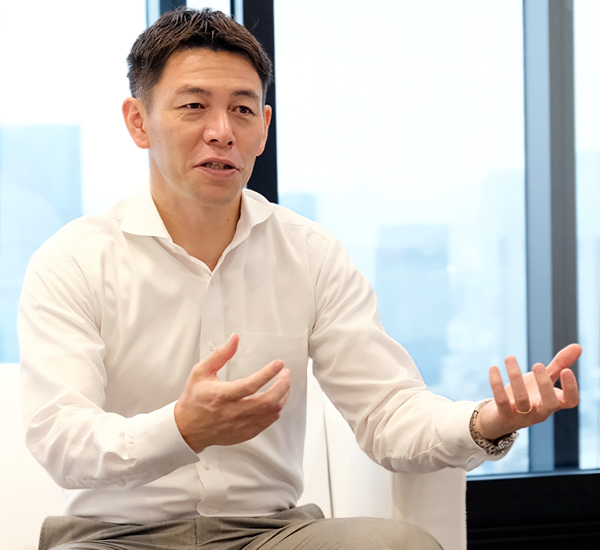
Team leader Yasumasu had been involved in developing platforms for providing consumer-oriented services using smartphones. He said that given his interest in how smartphone users’ personal data could be utilized, he began to consider two years ago how secure multiparty computation might be practically implemented.
“In data utilization, protecting the privacy of the individuals who created the data and handling risks like data leaks at companies that retain and use data are essential. For me, this all began when I was searching for some kind of technology out there that could resolve these concerns. The actual technology itself has already been around for 30 years, but I started focusing on it when I learned it was coming closer to being ready for practical implementation over the last 10 years.”
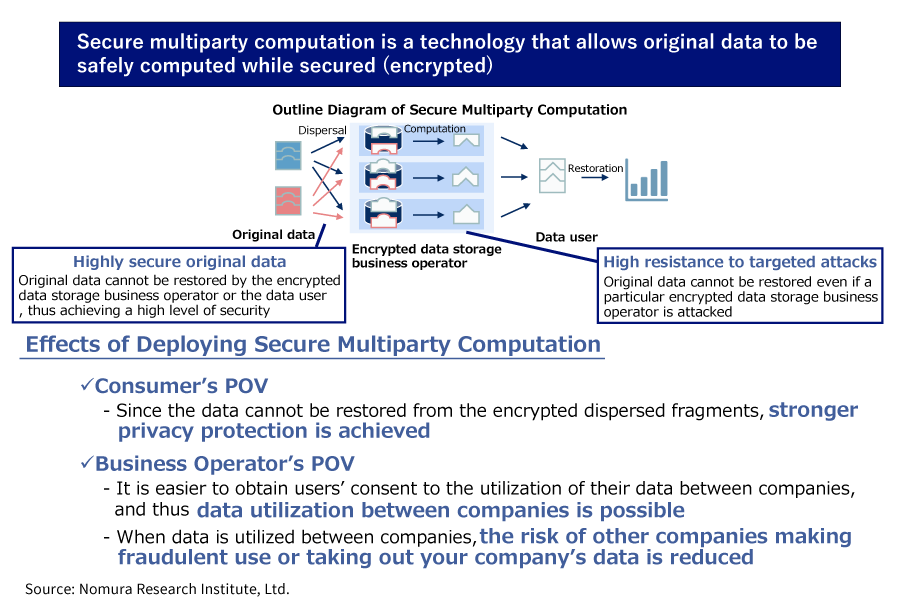
Making highly precise services possible
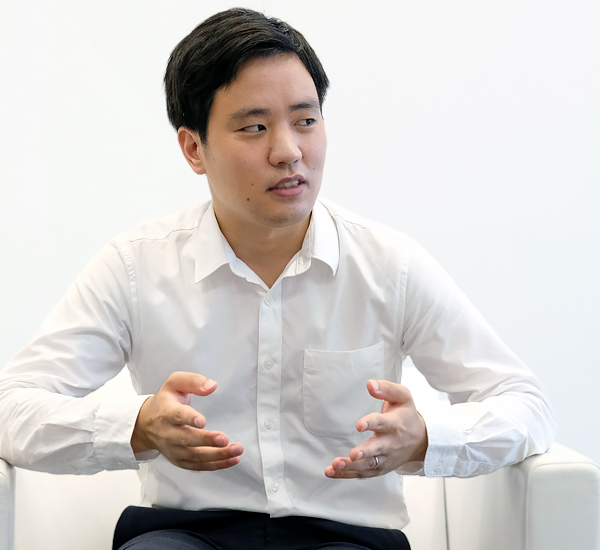
Nakajima is also someone who has discovered the possibilities of secure multiparty computation.
“Since this technology splits up and processes data so that the original data is concealed, there’s a lower risk of data getting leaked even if a particular business operator is attacked. Of course, this protects consumer privacy, but from a business standpoint it also makes it much easier for data to be utilized among companies. In the past one to two years, major companies in the US, China, Japan, and elsewhere have been moving forward with experimental trials, working to develop viable services from this technology.”

Tamura has been involved as a data scientist in a large number of analytics projects. He expects that several challenges that he has faced in his projects could perhaps be solved by secure multiparty computation.
“Personal information or confidential information can often be an obstacle in conducting data analysis, but it’s not simply an issue of giving and receiving data or taking it outside the company. It often happens in analytics that the client company’s internal data is not enough for running analyses. If there were a way to supplement another company’s data to make up for the data deficiency, it would have remarkable synergistic effects.”
That being said, what are the kinds of services for which this technology may be used? Yasumasu had this to add.
“If secure multiparty computation could be used to create environments that allowed individuals to safely provide companies with their own behavior histories or purchasing data, then these companies would for instance be able to recommend things like travel plans, insurance, or housing that’s tailored to customers’ individual preferences. Plus, if sensitive data like genome information or medical illness information could be safely and effectively utilized, then individuals could be provided with optimal treatment services or drug development. It would open the door to developing the kinds of detailed, precise services and products that individual companies have been unable to offer until now.”
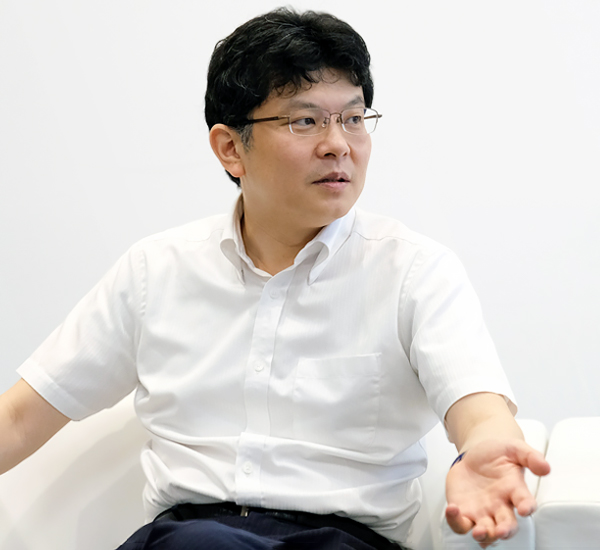
Hokazono, who provides cloud services to client companies in the financial world, expects that if the use of secure multiparty computation becomes possible, the information systems for which NRI has built and provided strong platforms could then be used in place of cloud systems. Hokazono also noted that by introducing secure multiparty computation, “financial institutions will be able to provide more personalized, more precise information to individual customers”, and added examples of this.
“For instance, let’s assume that a certain person wants to know about the future risks to the assets they own. But they don’t want anyone else to learn the amount of savings they have or their other asset information, or to know their age, or their address, or some other personal information. If they were to use secure multiparty computation, the inputted data would be encrypted and parsed, so they could receive a specific diagnosis or advice without giving up their privacy.
“Moreover, although individual financial institutions have tried to use AI to detect fraudulent transactions like bank transfer scams, the paucity of data has made this difficult to do properly. With secure computing, AI learning models can also be shared, without having to share the learning data itself.”
Hokazono believes this technology will even raise the level of detection precision for society as a whole.
The Challenge of Gaining Society’s Understanding
However, there are several challenges that must be overcome in order to achieve practical implementation. Rather than the technical challenges involved, it is the social challenges that concern Yasumasu the most.
“I think that with the efforts of various research institutions and companies, we can get past any technical challenges. I also believe that we too can find a way to implement this technology practically using specific methods. The problem has to do with the social barriers. I wonder if the average consumer would be able to grasp and trust this technology, which isn’t intuitively easy to understand, even if its security were said to be guaranteed. There are also no precedents for this in the corporate world, so companies are actually reluctant to be the first to use this technology. And what’s more, legislation needs to be developed as well.”
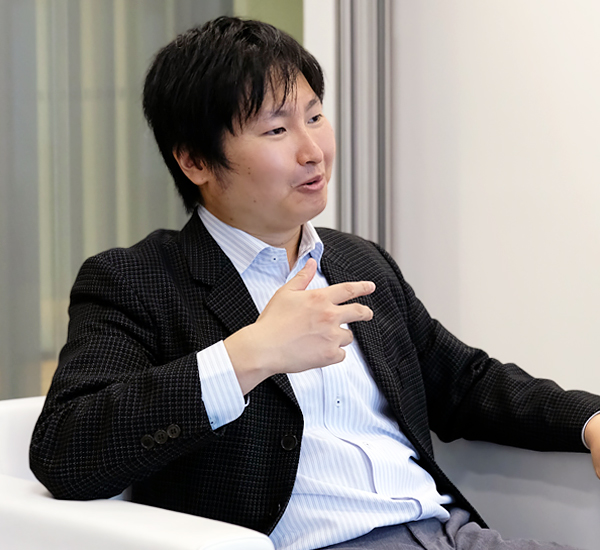
Kawaguchi, who had been involved in AI solutions development, also views the issue from the standpoint of how to popularize secure multiparty computation.
“In countries all over the world, there’s a movement that seeks to achieve urban design that changes society fundamentally by using AI and big data, and in Japan, too, the Super City Law was passed this year. However, I’ve heard that privacy protection issues are standing in the way of making this a reality. I think using secure multiparty computation will make it possible to break through these barriers. I think the first step to make that happen is getting consumers to understand this secure multiparty computation is being used and it’s safe. Otherwise, we’ll never really make it to practical implementation. That’s why I want to continue being active to expand this technology’s use, whether as part of my duties or not.”
What NRI can do
Being a member of NRI, Yasumasu believes, is precisely why he can contribute to solving these challenges.
“It’s said that data utilization across various fields is being promoted, but because individual companies are full of fears and suspicions that their date will get taken by other companies, cross-industry initiatives are actually very difficult to make happen. I think that’s why we need to steadily promote greater understanding among the industry-leading companies and core enterprises. NRI has business divisions that are connected with top companies as clients in securities, finance, insurance, retail, telecommunications, and other domains. I think NRI can be useful when it comes to working to enlighten companies about this technology.”
NRI expects that the progress of digitalization will bring major changes to how capitalism functions, and that going forward we will be transitioning to the age of “digital capitalism”. Digitalization will make it possible for people to lead richer lives, and with smart cities, where everywhere is connected to the internet by cutting-edge technology, we can expect a new type of future society in which digital technology is used for city development. Data utilization will play a vital role in achieving this kind of new society, as well as in solving many of the challenges facing Japan, such as its declining birthrate and aging society, its dwindling working population, and its regional decline. Compared to other countries, however, Japan is falling behind. NRI’s volunteer team will be working to bring about the practical implementation of secure multiparty computation, in an effort to find a way out of this situation.